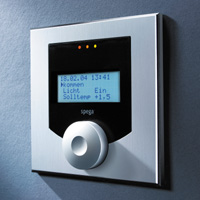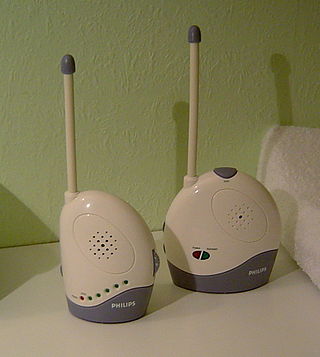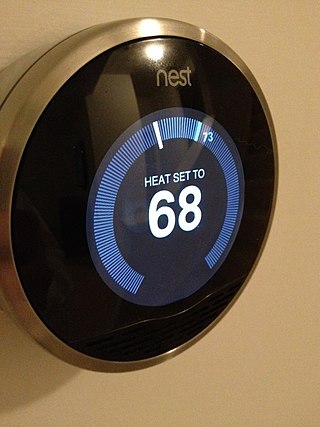Radio-frequency identification (RFID) uses electromagnetic fields to automatically identify and track tags attached to objects. An RFID system consists of a tiny radio transponder called a tag, a radio receiver, and a transmitter. When triggered by an electromagnetic interrogation pulse from a nearby RFID reader device, the tag transmits digital data, usually an identifying inventory number, back to the reader. This number can be used to track inventory goods.

Home automation or domotics is building automation for a home. A home automation system will monitor and/or control home attributes such as lighting, climate, entertainment systems, and appliances. It may also include home security such as access control and alarm systems.

The concept of home improvement, home renovation or remodeling is the process of renovating, making improvements or making additions to one's home. Home improvement can consist of projects that upgrade an existing home interior, exterior or other improvements to the property. Home improvement projects can be carried out for a number of different reasons; personal preference and comfort, maintenance or repair work, making a home bigger by adding rooms/spaces, as a means of saving energy, or to improve safety.

A baby monitor, also known as a baby alarm, is a radio system used to remotely listen to sounds made by an infant. An audio monitor consists of a transmitter unit, equipped with a microphone, placed near to the child. It transmits the sounds by radio waves to a receiver unit with a speaker carried by, or near to, the person caring for the infant. Some baby monitors provide two-way communication which allows the parent to speak back to the baby. Some allow music to be played to the child. A monitor with a video camera and receiver is often called a baby cam.
Building automation (BAS), also known as building management system (BMS) or building energy management system (BEMS), is the automatic centralized control of a building's HVAC, electrical, lighting, shading, access control, security systems, and other interrelated systems. Some objectives of building automation are improved occupant comfort, efficient operation of building systems, reduction in energy consumption, reduced operating and maintaining costs and increased security.

Home security includes both the security hardware placed on a property and individuals' personal security practices. Security hardware includes doors, locks, alarm systems, lighting, motion detectors, and security camera systems. Personal security involves practices like ensuring doors are locked, alarms are activated, owning a Dog, windows are closed, and extra keys are not hidden outside.

An Internet Protocol camera, or IP camera, is a type of digital video camera that receives control data and sends image data via an IP network. They are commonly used for surveillance, but, unlike analog closed-circuit television (CCTV) cameras, they require no local recording device, only a local area network. Most IP cameras are webcams, but the term IP camera or netcam usually applies only to those that can be directly accessed over a network connection.
Internet of things (IoT) describes devices with sensors, processing ability, software and other technologies that connect and exchange data with other devices and systems over the Internet or other communication networks. The Internet of things encompasses electronics, communication, and computer science engineering. "Internet of things" has been considered a misnomer because devices do not need to be connected to the public internet; they only need to be connected to a network and be individually addressable.

Smart thermostats are Wi-Fi thermostats that can be used with home automation and are responsible for controlling a home's heating, ventilation, and air conditioning. They perform similar functions as a Programmable thermostat as they allow the user to control the temperature of their home throughout the day using a schedule, but also contain additional features, such as sensors and Wi-Fi connectivity, that improve upon the issues with programming.

Google Nest is a line of smart home products including smart speakers, smart displays, streaming devices, thermostats, smoke detectors, routers and security systems including smart doorbells, cameras and smart locks.

ecobee is a Canadian founded home automation company that makes smart thermostats, temperature, and occupancy sensors, smart light switches, smart cameras, and contact sensors. They were acquired by the American company Generac Holdings in 2021.

Ring LLC is a manufacturer of home security and smart home devices owned by Amazon. It manufactures a titular line of smart doorbells, home security cameras, and alarm systems. It also operates Neighbors, a social network that allows users to discuss local safety and security issues, and share footage captured with Ring products. Via Neighbors, Ring may also provide footage and data to law enforcement agencies to assist in investigations.

LIFX is a line of energy-efficient, multi-color, Wi-Fi enabled, digital addressable LED light bulbs that can be controlled via a Wi-Fi equipped device such as a smartphone or smartwatch.

HomeKit, also known as Apple Home, is a software framework and communication protocol developed by Apple Inc. that lets users configure, communicate with and control smart-home appliances using Apple devices. It provides users with a way to automatically discover such devices and configure them. By designing rooms, items and actions in HomeKit, users can enable automations in the home through a voice command to Siri or through Apple's Home app or third party apps. With HomeKit, developers are able to create complex applications in order to manage accessories at a high level.
Amazon Echo, often shortened to Echo, is a brand of smart speakers developed by Amazon. Echo devices connect to the voice-controlled intelligent personal assistant service Alexa, which will respond when a user says "Alexa". Users may change this wake word to "Amazon", "Echo", "Computer", and other options. The features of the device include voice interaction, music playback, making to-do lists, setting alarms, streaming podcasts, and playing audiobooks, in addition to providing weather, traffic and other real-time information. It can also control several smart devices, acting as a home automation hub.

The Nest Thermostat is a smart thermostat developed by Google Nest and designed by Tony Fadell, Ben Filson, and Fred Bould. It is an electronic, programmable, and self-learning Wi-Fi-enabled thermostat that optimizes heating and cooling of homes and businesses to conserve energy.
Netatmo is a French company which manufactures smart home devices. Founded in 2011, it has launched a variety of products including various security cameras, personal weather stations, and an internet-connected smoke detector.
HomeSeer Technologies LLC is a technology company based in Bedford, New Hampshire, in the United States. HomeSeer makes home automation controllers and software, designed to integrate lighting, HVAC, security, AV and other subsystems in most homes. Additionally, the company maintains an online store of compatible home automation products and a free online community forum for users and dealers.

Wink is an American brand of software and hardware products that connects with and controls smart home devices from a consolidated user interface. Wink, Labs Inc., which develops and markets Wink, was founded in 2014 as a spin-off from invention incubator Quirky. After Quirky went through bankruptcy proceedings, it sold Wink to Flex in 2015. As of 2016, the Wink software is connected to 1.3 million devices. In July 2017, Flex sold Wink to i.am+ for $59 million.
Hive is a trademark owned by Centrica Hive Limited that produces smart home devices. It is one of the largest connected home providers in the UK and, as of May 2018, the company had more than 1,000,000 customers.













